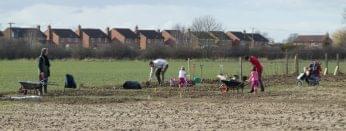Caritas Social Action Network has co-signed a joint open letter to the Prime Minster calling on him not to go ahead with the planned £20-a-week cut to Universal Credit and Working Tax Credit, due to come into effect on 6 October 2021. With 100 signatory organisations operating at national and community levels in the United Kingdom, the letter represents what is believed to be the largest coalition to date on this issue.
The Joseph Rowntree Foundation coordinated the letter. Signatories include leading voices on health, education, children, housing, poverty, the economy and other aspects of public policy.
Open letter to the Prime Minister. Rt Hon Boris Johnson MP
Dear Prime Minister,
We are writing to collectively urge you not to go ahead with the planned £20-a-week cut to Universal Credit and Working Tax Credit at the beginning of October.
Many of us provide frontline support in communities up and down our country and see first-hand the importance of our social security system. Life is full of crises that we cannot plan for, such as job loss or illness, and periods of lower earnings or caring responsibilities. We all need the security and stability of a strong lifeline, not just during a national crisis, but every day.
Imposing what is effectively the biggest overnight cut to the basic rate of social security since World War II will pile unnecessary financial pressure on around 5.5 million families, both in and out of work.
At the start of the pandemic, the Chancellor rightly said that he was introducing the £20 increase to “strengthen the safety net” – a tacit admission that a decade of cuts and freezes had left it unfit to provide the support families need. We all strongly supported this crucial improvement in support.
We are at risk of repeating the same mistakes that were made after the last economic crisis, where our country’s recovery was too often not felt by people on the lowest incomes. The erosion of social security support was one of the main drivers of the rise in in-work and child poverty, and contributed to a soaring need for food banks, rising debt and worsening health inequalities.
We deeply regret that the Department for Work & Pensions has not published its assessment on the impact of cutting Universal Credit and Working Tax Credit. However, the latest independent analysis from the Joseph Rowntree Foundation (JRF) shows it risks plunging 500,000 people into poverty, including 200,000 children. It will take the main rate of out of work support down to its lowest levels in real terms since around 1990.
This is not a question of having to choose between a recovery based on getting people into jobs or investing in social security, in fact most families impacted by this cut to Universal Credit and Working Tax Credit are already in work. The reality of the UK labour market means that to improve living standards, we need to both improve job quality and strengthen the social security system. We also must never lose sight of the need to provide adequate support to families who are not able to work so they can meet their needs with dignity.
Six former Conservative Work & Pensions Secretaries believe previous cuts to social security spending went too far and oppose this cut, and your own Conservative MPs are warning that it will have deep and far-reaching effects in their constituencies.
Recent analysis from JRF shows that 413 parliamentary constituencies across Great Britain will see over a third of working-age families with children hit by the planned cut to Universal Credit and Working Tax Credit on 6 October 2021. Of these 413 constituencies, 191 are Conservative – 53 of which were newly won at the last general election or in a subsequent by-election.
This looming cut would fundamentally undermine the Government’s mission to level up. Citizens Advice has identified that people are one and a half times more likely to claim Universal Credit in places the Government has prioritised for levelling up investment. They also found for every £1 that could be invested from the Levelling Up Fund in England, £1.80 would be taken from these local economies if the Government presses ahead.
Furthermore, it is unacceptable that legacy benefits, such as Employment and Support Allowance, Jobseeker’s Allowance and Income Support, continue to be excluded from this crucial improvement in support, mostly impacting people who are sick, disabled or carers.
We are rapidly approaching a national crossroads which will reveal the true depth of the Government’s commitment to improving the lives of families on the lowest incomes.
We all want a social security system that supports families to escape poverty rather than pulling them deeper into it. However, this cut risks causing immense, immediate, and avoidable hardship. A strong social security system is a crucial first step to building back better. We strongly urge you to make the right decision.
Yours sincerely,
Action For Children; Advice NI; APLE Collective; The Association of Charitable Organisations; Become; Bevan Foundation; The Big Issue; Bright Blue; The British Association of Social Workers; British Psychological Society; Business in the Community; Carers UK; Caritas Social Action Network; Centre for Cities; Centrepoint; Child Poverty Action Group; Children England; Christians Against Poverty; Church Action on Poverty; Citizens Advice; Citizens Advice Scotland; Citizens UK; Communities that Work; Crisis; Disability Benefits Consortium (a network of over 100 disability organisations); Employment Related Services Association (ERSA); End Child Poverty Coalition; End Furniture Poverty; The Equality Trust; The Faculty of Public Health; Family Fund; Feeding Britain; The Food Foundation; Generation Rent; Gingerbread, the charity for single parent families; Greater Manchester Poverty Action; The Health Foundation; Homeless Link; The Hygiene Bank; Independent Food Aid Network; Institute for Public Policy Research (IPPR); Joseph Rowntree Foundation; Jubilee Debt Campaign; Learning and Work Institute; Little Village; Lloyds Bank Foundation for England & Wales; Macmillan Cancer Support; Mental Health Foundation; Mind; Money Advice Trust; The MS Society; National AIDS Trust; National Association of Head Teachers (NAHT); National Children’s Bureau; National Education Union; National Housing Federation; National Residential Landlords Association; National Survivor User Network; Neighbourly; New Economics Foundation; North East Child Poverty Commission; Northern Housing Consortium; Octavia; One Parent Families Scotland; Oxfam GB; PlaceShapers; Policy in Practice; The Poverty Alliance; The Poverty Truth Community; Rethink Mental Illness; RNIB (Royal National Institute of Blind People); RNID; The Robertson Trust; Royal College of Paediatrics and Child Health; Royal College of Psychiatrists; Royal Society for Public Health; The Runnymede Trust; The Salvation Army; Save the Children; Scope; Scottish Out of School Care Network; Shelter; St Mungo’s; Standard Life Foundation; StepChange; Sustain: the alliance for better food and farming; SVP Northern Ireland; Transforming Lives for Good (TLG); The Trussell Trust; Trust for London; TUC (Trades Union Congress); Turn2us; UCL Institute of Health Equity; UK Women’s Budget Group; Women’s Regional Consortium Northern Ireland; Working Families; Young Lives vs Cancer; Young Women’s Trust; Z2K, and 4in10 London’s Child Poverty Network.





